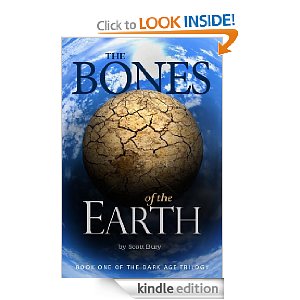Today, we at the green porch (yes I refer to myself as plural) welcome Independent author and novelist Scott Bury to discuss with us his definition of being indie! Check out his blog, Written Words, for my “Best and Worst.” (And no, they aren’t incriminating photos. Get your mind out of the gutter.) His novel, The Bones of the Earth (The Dark Age), can be found at Amazon as well as many other fine ebook retailers. Enjoy!

What it isn’t: richifyin’—a way to make money. If you have a cockamamie get-rich-quick scheme, it’s probably a more reliable way to earn a living than writing novels.
What it is:
1.) empowering — I can create characters, plots, even whole worlds and do exactly what I want with them. In my own little way, I can be God.
2.) liberating — Because I am independent, I don’t have to listen to any pesky agents, editors or publishers telling me which way to go, add plot points, make the character a little more this and a little less that.
Illustration: Nicolai Gogol was forced by the Imperial Russian government to change his novel Taras Bulba, about the Cossack from Ukraine who defeats a Polish prince, because it was too encouraging of Ukrainian nationalism. Remember, Russia held sway over Ukraine at this time, having wrested it from other occupiers centuries earlier. Even today, Ukrainians draw inspiration from this novel. Gogol had to add references to “the Russian homeland” and other nonsense that did not fit at all.
As an independent novelist, I am free to add or omit any themes or ideas that I want to. I can also experiment with language if I want to. I can explore plots, history, places and characters. I can break rules and conventions of literary genres. I don’t have to worry about an agent or an editor not getting it. I just have to worry about readers.
 Illustration 2: When I sent my manuscript to publishers, one responded that he was rejecting it because “I can’t imagine any editor NOT throwing up his hands over the name ‘Hrech.'” He also felt that my main character’s name, Javor, was “goddamn ugly” and a deal-breaker.
Illustration 2: When I sent my manuscript to publishers, one responded that he was rejecting it because “I can’t imagine any editor NOT throwing up his hands over the name ‘Hrech.'” He also felt that my main character’s name, Javor, was “goddamn ugly” and a deal-breaker.
Those are real names from a culture that exists today—it’s just beyond that editor’s own little world-view. I kept those names. No, they’re not English or even Western European, and they’re not made-up, either. Did I just break two rules? Yep. Get used to it.
3.) educational — Publishing my own novel has forced me to learn new skills: formatting for EPUB and MOBI publication, and new communications media like Twitter. I also still have to develop my facility with Facebook, LinkedIn and Google Plus.
And I have to learn better time management. There just are not enough hours in a day to make optimal use of social media, hold down the day job, pay attention to my family, take care of my own life and write the next novel.
4.) humbling — I know my abilities as a writer and an editor, but I also know my limitations as a marketer. I suck at selling stuff (but I’m an ace at alliteration). The ONE thing that I would like a publishing company for is their marketing ability.
5.) mystifying — I just don’t know how to get more people to buy and read my work, whether it’s my novel (available on Amazon, Smashwords, Sony and elsewhere) or my short stories (free on my own blog).
6.) humbling — I know I already wrote “humbling,” but there is another humblizin’ aspect to being an independent novelist. Since I started down (up) this self-publishing road (twisting, overgrown goat path straight up an Alp), I have discovered so many other independent writers whose skills at writing, formatting, social networking and marketing outshine my own by factors of magnitude. Yes, there are a lot of poor writers out there, and some who have skipped the editing stage. But there are also many excellent ones.
Honestly, I don’t think that the ratio of good to bad writers is any worse among the independent/self-published authors than on the shelves at the mega bookstore in my town. But that’s a subject for another column.
So, to answer David’s question: what is it to be an independent writer? It’s thrilling to know that others are reading my fiction. It’s exciting to see my name mentioned in a review. It’s extremely satisfying when I read something that shows the reader got the point I was trying to make.
What does it all mean, though? It means that I still put hope ahead of reality.